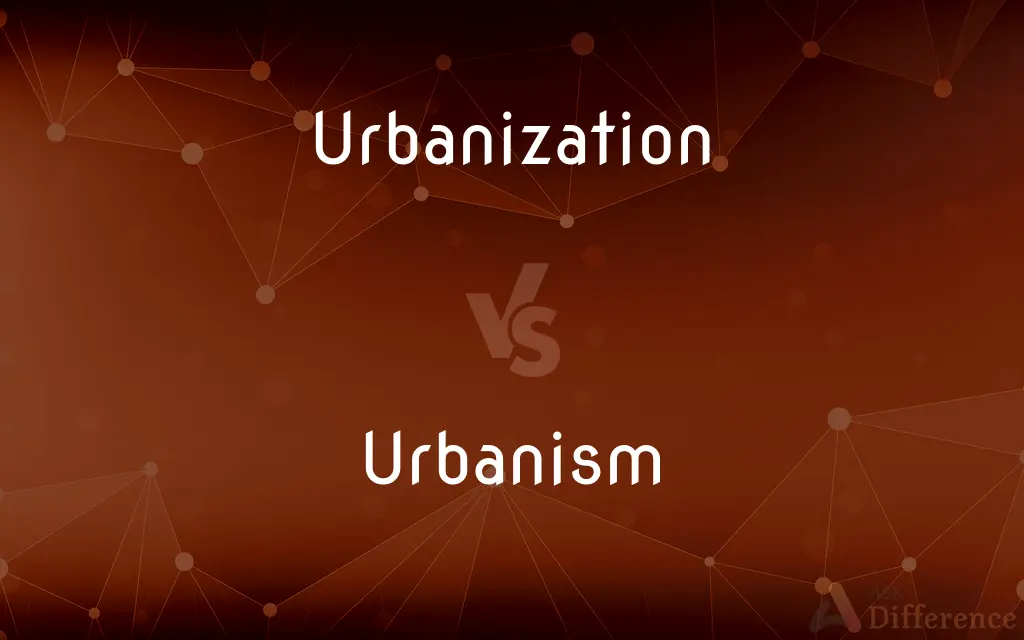Urbanization vs. Urbanism — What's the Difference?
By Tayyaba Rehman — Updated on November 7, 2023
Urbanization is the process of developing urban areas, while urbanism is the study of urban life and culture.

Difference Between Urbanization and Urbanism
Table of Contents
ADVERTISEMENT
Key Differences
Urbanization refers to the demographic transition from rural to urban, where cities grow as more people inhabit them. Urbanism, on the other hand, encompasses theories and principles on how urban spaces are created and used. While urbanization is measurable through population size and infrastructure expansion, urbanism provides qualitative insights into urban experiences and living conditions.
Urbanization is a tangible and quantifiable change involving the expansion of cities and an increase in the urban population. Urbanism deals with the lifestyle within urban spaces, focusing on social, cultural, and environmental aspects. Urbanization can be seen in the construction of skyscrapers, roads, and housing complexes, whereas urbanism can be seen in how public spaces are designed for interactions, or how transportation influences social behavior.
Urbanization is a process driven by factors like economic development and industrialization leading to physical growth of urban centers. Urbanism examines the resulting way of life, societal norms, and the impact on human behavior and interactions. While urbanization can be tracked by census data and satellite images showing city spread, urbanism requires sociological and anthropological analysis of urban dwellers.
Urbanization often results in denser housing, commercial, and industrial areas. In contrast, urbanism might critique these developments through the lens of sustainability and quality of life. The pace of urbanization could stress infrastructure and services, while urbanism seeks to address these challenges through thoughtful design and planning.
Urbanization changes landscapes, converting rural to urban, and typically reflects economic progress. Urbanism, as a broader concept, deals with the ethos and strategic planning of urban areas, aiming to improve inhabitants' well-being and preserve the urban environment. Urbanization's impact is observable, while urbanism's influence is experienced in the day-to-day life of urban residents.
ADVERTISEMENT
Comparison Chart
Definition
The process of becoming urban.
The study of urban life and the built environment.
Focus
Population growth, infrastructure, city expansion.
Urban lifestyle, culture, city design, and planning.
Measurement
Quantitative (population density, infrastructure).
Qualitative (social interactions, planning outcomes).
Academic Discipline
Geography, demography.
Sociology, urban planning.
Associated Changes
Physical (buildings, roads).
Conceptual (ideas of living, community dynamics).
Compare with Definitions
Urbanization
The increase in the urban population.
Urbanization has doubled the city's population in two decades.
Urbanism
The study of cities and their inhabitants' lifestyle.
Her book on urbanism dissected the community dynamics of New York City.
Urbanization
The expansion of cities into surrounding areas.
The urbanization of the suburbs has led to more job opportunities locally.
Urbanism
The process of planning and developing cities.
Modern urbanism puts a strong emphasis on green spaces.
Urbanization
The transformation from rural to urban.
Rapid urbanization is changing the face of the countryside.
Urbanism
The pattern of life typical to urban areas.
Urbanism influences how public spaces are designed.
Urbanization
The social process whereby cities grow and societies become more urban
Urbanism
Cultural and social aspects of city life.
Urbanism in the 21st century reflects a digital, fast-paced lifestyle.
Urbanization
The development of urban areas and infrastructure.
The mayor's plan for urbanization includes new parks and public transport.
Urbanism
Urbanism is the study of how inhabitants of urban areas, such as towns and cities, interact with the built environment. It is a direct component of disciplines such as urban planning, which is the profession focusing on the physical design and management of urban structures and urban sociology which is the academic field the study of urban life and culture.Many architects, planners, geographers, and sociologists investigate the way people live in densely populated urban areas.
Urbanization
Urbanization (or urbanisation) refers to the population shift from rural to urban areas, the corresponding decrease in the proportion of people living in rural areas, and the ways in which societies adapt to this change. It is predominantly the process by which towns and cities are formed and become larger as more people begin living and working in central areas.Although the 2 concepts are sometimes used interchangeably, urbanization should be distinguished from urban growth.
Urbanism
The culture or way of life of city dwellers.
Urbanization
To make urban in nature or character.
Urbanism
Urbanization.
Urbanization
The process of the formation and growth of cities.
Urbanism
The theory of city planning.
Urbanization
The change in a country or region when its population migrates from rural to urban areas.
Urbanism
The study of cities, their geographic, economic, political, social, and cultural environment.
Urbanization
The proportion of a region's population that live in towns and cities; the rate at which this proportion is growing.
Urbanism
The culture or way of life of people who live in cities.
Urbanization
The condition of being urbanized
Urbanism
Urbanization.
Urbanization
The concentration of resources in cities.
Urbanization has centralized healthcare services within metropolitan areas.
Urbanism
Urban planning.
Urbanism
Architectural design and urban planning.
The project showcases cutting-edge urbanism with its mixed-use development.
Common Curiosities
Can urbanization lead to overpopulation?
Yes, urbanization can sometimes lead to overpopulation in urban areas, straining resources and infrastructure.
Does urbanism only apply to large cities?
No, urbanism applies to the study and planning of any urban area, regardless of size.
Are urbanization rates increasing globally?
Yes, global urbanization rates are increasing as more people move to cities for various reasons.
How does urbanism affect city design?
Urbanism affects city design through planning principles that aim to improve functionality and quality of life.
What role do urban planners play in urbanism?
Urban planners apply principles of urbanism to create efficient, sustainable, and livable cities.
How do sociologists contribute to urbanism?
Sociologists contribute to urbanism by studying social trends, behaviors, and impacts of urban life.
Can urbanization affect culture?
Yes, urbanization can affect culture by introducing diverse populations and new cultural dynamics to cities.
What drives urbanization?
Economic opportunities, population growth, and industrialization typically drive urbanization.
Is urbanization a recent phenomenon?
While urbanization has escalated recently, it has been occurring since ancient times as civilizations developed.
What is the main goal of urbanism?
The main goal of urbanism is to design and promote better living conditions and sustainable urban environments.
Can rural areas experience urbanization?
Yes, rural areas can experience urbanization as they grow and adopt urban characteristics.
How does urbanism impact the environment?
Urbanism impacts the environment through urban planning that can either harm or protect natural resources.
What is the result of rapid urbanization?
Rapid urbanization can lead to challenges like overcrowding, housing shortages, and increased pollution.
Does urbanism consider economic factors?
Yes, economic factors are integral to urbanism for the development and sustainability of urban areas.
Is urbanism a multidisciplinary field?
Yes, urbanism is a multidisciplinary field that involves architecture, planning, sociology, and environmental studies.
Share Your Discovery

Previous Comparison
Intelligent vs. Cunning
Next Comparison
Want vs. WillingAuthor Spotlight
Written by
Tayyaba RehmanTayyaba Rehman is a distinguished writer, currently serving as a primary contributor to askdifference.com. As a researcher in semantics and etymology, Tayyaba's passion for the complexity of languages and their distinctions has found a perfect home on the platform. Tayyaba delves into the intricacies of language, distinguishing between commonly confused words and phrases, thereby providing clarity for readers worldwide.















































